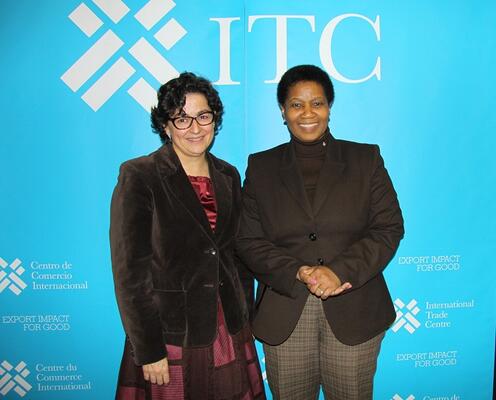
ITC and UN Women want stronger United Nations focus on women’s economic empowerment
The International Trade Centre (ITC) and UN Women will scale up their cooperation to facilitate the creation of more jobs and entrepreneurial opportunities for women. Phumzile Mlambo-Ngcuka, Executive Director of UN Women and Arancha González, Executive Director of ITC met in Geneva earlier this week, looking to find ways to deepen collaboration between the two United Nations organizations.
In particular, the leaders of the two agencies want to increase efforts to ensure that more services and goods are sourced from women-owned businesses. Women entrepreneurs are a growing economic force with 34% of firms worldwide having female participation in ownership, and yet women access a limited share of procurement opportunities.
In addition, they want to increase assistance to women in post-conflict countries, to empower them to participate in trade and achieve economic independence.
‘For UN Women to help create greater economic empowerment for women, it is important to work together with other UN agencies such as ITC,’ said Ms. Mlambo-Ngcuka. ‘This, as well as greater cooperation with the private sector and civil society, will better enable us to create opportunities for women to become economic citizens, for women to become entrepreneurs, for women to create jobs for themselves and as such alleviate poverty.’
‘Closer cooperation with ITC would be great as this would allow us to use ITC’s capacity and expertise to make sure that what UN Women does is done even better,’ said Ms. Mlambo-Ngcuka.
Both agencies share the view that economic empowerment is important in a post-2015 development context.
‘From now until 2030, up to 80% of jobs globally will be created by small and medium-sized enterprises (SMEs),’ Ms. González said. ‘Most women will be employed by SMEs or actually own SMEs. This has to be reflected in the shaping of the post-2015 development agenda.’
‘There needs to be a growth component in the post-2015 development agenda that aims to unlock the potential of SMEs and that of women in trade,’ Ms. González added. ‘This is true for SMEs and women in emerging economies, as well as for those in post-conflict countries.’
Ms. Mlambo-Ngcuka said that a closer partnership with ITC and other United Nations agencies would allow UN Women to take advantage of their business and trade-related expertise, thereby enabling UN Women to expand work in sectors ‘in which destiny-changing economic growth … is possible’.



